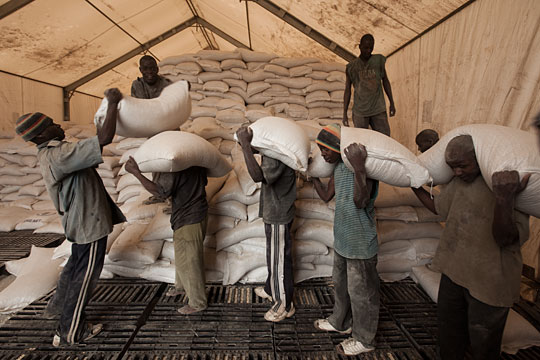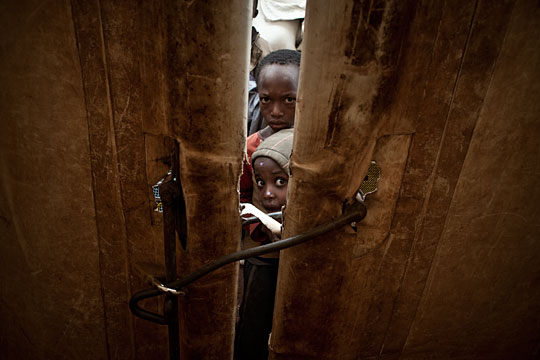After years of foreign aid pouring into the East African country of Rwanda following its 1994 civil war and genocide, its citizens are used to receiving help from those on the outside. Those tables could finally be turning, however. Recently I documented the Bill & Melinda Gates Foundation’s Purchase for Progress (P4P) initiative, a program wherein food aid for Africa is bought, not from a farmer in Iowa or Australia and shipped thousands of miles to its destination, but from right here in Africa.
Rwanda is home to some 55,000 refugees, most of whom are sheltering from ongoing turmoil in the Democratic Republic of Congo, its neighbor to the west. Most of these refugees are landless and unable to provide for themselves and their families. Consequently they’re reliant on food aid. Above, children race a homemade scooter through the streets of Kaziba refugee camp along the shores of Lake Kivu in western Rwanda.
The Gates Foundation works through its grantee, the UN World Food Program, (WFP) to connect small farmers to a larger market by setting up cooperatives at the village level. Training and capacity building of these farmers are essential parts of the program in order to ensure that a quality product is passed on to the recipient. Above, Niyonsaba Gaspard (16) harvests corn in Musaza village in Eastern Rwanda.
For the first time this year, the World Food Program held a trade fair in Kigali, Rwanda’s capital city. The forum was an opportunity for food buyers to connect with P4P’s small farmers cooperatives from different parts the country. By pooling their resources and selling their food in bulk, Rwandan small farmers are now not only supplying food to the WFP but also exporting it to other markets in East Africa and beyond. Above, women from the COACNU in Musaza cooperative winnow corn outside their co-op’s headquarters before it’s weighed, bagged and shipped off to Kigali.
For decades small farmers have been crippled by lack of access to markets despite their geographic proximity to food buyers and recipients. By forming into cooperatives, farmers now have an opportunity to enter the market and sell their surplus harvest at competitive prices. Buyers like the WFP can distribute their food aid more quickly without having to pay for pricey freight and insurance costs when buying from outside. It’s a win-win situation for buyers and farmers.
Food aid from the west hasn’t been discontinued. Rwanda does not yet have the capacity to completely provide for itself and the refugees within its borders. But as the Purchase for Progress effort is scaled up, we can look forward to a day when Africa and other developing areas are food secure. P4P is working in 21 countries world-wide, 15 of which are in Africa.











